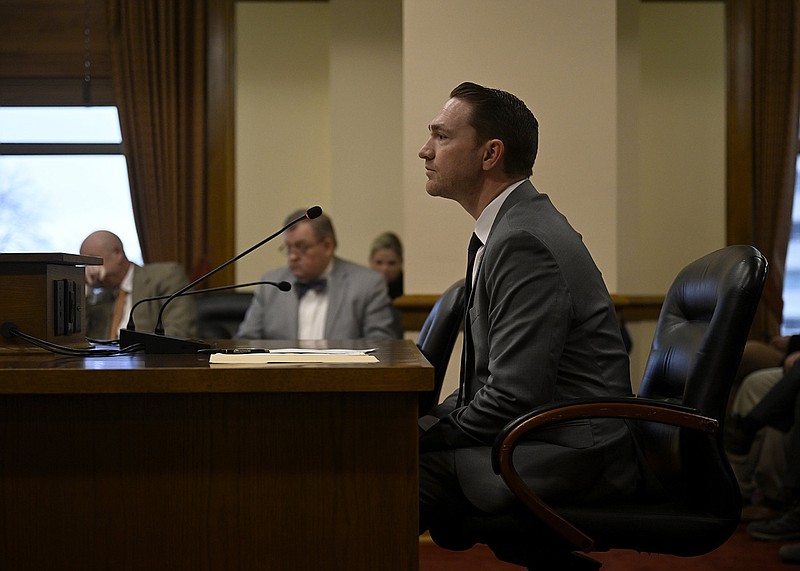A bill that would hold pornography websites liable for displaying content to minors passed the Senate Committee on Insurance and Commerce on Tuesday.
Senate Bill 66 would require commercial entities displaying pornography to use a "reasonable age verification method" which includes providing a digital ID, a government-issued ID or any "commercially reasonable age verification method."
The Senate panel endorsed the bill in a voice vote without audible dissent.
Sen. Tyler Dees, R-Siloam Springs, said his bill was needed to protect children who often have access to digital devices at young ages.
[DOCUMENT: Read Copy of Senate Bill 66
» arkansasonline.com/201bill66/]
"When I look at my children -- I'm a father of three young kids -- and I see technology advancing, and the way I describe it is as a weapon," he told committee members. "It's a sword, and it can be used for good or it can be used to cut your own arm off."
The bill claims pornography is "creating a public health crisis" and contributing "to the hyper-sexualization of minors."
Following the meeting, Dees said he was inspired to file the bill by a recently enacted law in Louisiana that contains many of the same provisions.
Dees' bill would apply to any website where more than a third of the content may be "material harmful to minors."
The proposed law defines these materials as "designed to appeal to, or is designed to pander to, prurient interest" and specifically points to "descriptions of actual, simulated, or animated displays or depictions of ... nipple of the female breast, pubic hair, anus, vulva, or genitals; touching, caressing, or fondling of nipples, breasts, buttocks, the anus, or genitals; or sexual intercourse, masturbation, sodomy, bestiality, oral copulation, flagellation, excretory functions, exhibitions of sexual acts, or any other sexual act."
The content as a whole would have to lack "serious literary, artistic, political, or scientific value for minors."
Any websites that fail to confirm user ages would be liable for damages under the legislation. The bill provides exemptions for news sites and internet service providers.
"Just about literally every other adult oriented business and industry we regulate with an age verification process," Dees told committee members. "If you try to go and buy cigarettes over the counter, you show identification."
Sen. Missy Irving, R-Mountain View, said that while she supported the bill, she had heard from a constituent who was concerned about how the legislation might lead to websites tracking user data.
Dees pointed to a provision in his bill that would hold companies liable for damages if they retained any identifying information after granting a user access to their content.
"I think that all of us should be concerned about your identification, your personal information on any online site," he said. "I'd also add that if you do have concerns of any site that you don't think is reputable or has the ability to not share your data, then I'd advise you not to go to those websites."
Irving said she believed parents bear some of the responsibility for preventing their children from accessing harmful material.
"I think it's very important for us to clearly, clearly state that there is a failure happening with parents who are handing devices to their children as early as the age of four or three or two," she said. "We do not do enough in this government or anywhere to educate parents about the harmful things that are happening with these devices."
Jerry Cox, executive director of the Family Council, spoke in favor of the bill, saying it "is on the cutting edge of where we need to be as policy makers." He referenced legislation that has appeared in other statehouses and U.S. Congress that have pushed online companies to change their policies regarding content available to minors.
After a law similar to Dees' bill went into effect in Louisiana on Jan. 1, Pornhub, a major adult site, began requiring age verification from users with Louisiana IP addresses. Other major adult sites were still accessible from Louisiana as normal, VICE News reported Jan. 3.
On the federal level, U.S. Sen. Mike Lee, a Republican from Utah, introduced a bill in December that would require age verification to access pornographic sites.
No one came before the committee to provide testimony against the bill.

